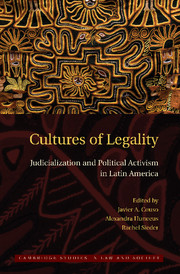Book contents
- Frontmatter
- Contents
- Contributors
- PART I INTRODUCTION
- PART II COURTS AND JUDICIALIZATION THROUGH A CULTURAL LENS
- PART III JUDICIALIZATION BEYOND THE COURTS
- 6 The Transformation of Constitutional Discourse and the Judicialization of Politics in Latin America
- 7 Legal Cultures in the (Un)Rule of Law: Indigenous Rights and Juridification in Guatemala
- 8 Political Activism and the Practice of Law in Venezuela
- 9 The Mapuche People's Battle for Indigenous Land: Litigation as a Strategy to Defend Indigenous Land Rights
- 10 Judicialization in Argentina: Legal Culture or Opportunities and Support Structures?
- 11 Novel Appropriations of the Law in the Pursuit of Political and Social Change in Latin America
- Index
- CAMBRIDGE STUDIES IN LAW AND SOCIETY
- References
7 - Legal Cultures in the (Un)Rule of Law: Indigenous Rights and Juridification in Guatemala
Published online by Cambridge University Press: 20 May 2010
- Frontmatter
- Contents
- Contributors
- PART I INTRODUCTION
- PART II COURTS AND JUDICIALIZATION THROUGH A CULTURAL LENS
- PART III JUDICIALIZATION BEYOND THE COURTS
- 6 The Transformation of Constitutional Discourse and the Judicialization of Politics in Latin America
- 7 Legal Cultures in the (Un)Rule of Law: Indigenous Rights and Juridification in Guatemala
- 8 Political Activism and the Practice of Law in Venezuela
- 9 The Mapuche People's Battle for Indigenous Land: Litigation as a Strategy to Defend Indigenous Land Rights
- 10 Judicialization in Argentina: Legal Culture or Opportunities and Support Structures?
- 11 Novel Appropriations of the Law in the Pursuit of Political and Social Change in Latin America
- Index
- CAMBRIDGE STUDIES IN LAW AND SOCIETY
- References
Summary
INTRODUCTION
Reflecting on recent patterns of judicialization in Latin America, Guillermo O'Donnell pointed to the relationship between judicialization and juridification, stating: “The judicialization of social relations (whereby social claims are pursued through the courts or court-like structures) is probably an expression of the increasing juridification of social relations: the mounting degree to which social relations, formerly left to autonomous and/or informal regulation, are being textured by formal legal rules” (O'Donnell 2005: 293). Tate and Vallinder, writing about judicialization – which they define as the global expansion of judicial power, make a similar although subtly different distinction between “the judicialization of politics” and a second, distinct phenomenon, namely, the “less dramatic instance of the expansion of judicial power, or judicialization, [that is] the domination of nonjudicial negotiating or decision-making arenas by quasi-judicial (legalistic) procedures” (Tate and Vallinder 1995: 5).
In this chapter I focus on this second, more diffuse aspect of judicialization, which I refer to here as juridification. Discussion of the phenomenon of juridification has traditionally focused on advanced capitalist economies and welfare states rather than on the developing economies and fragile democracies of Latin America. Broadly speaking, in Western Europe and the United States, juridification signals Weberian processes of bureaucratization and the expansion of law into more and more areas of social life, such as industrial relations, social welfare provision, and economic production.
- Type
- Chapter
- Information
- Cultures of LegalityJudicialization and Political Activism in Latin America, pp. 161 - 181Publisher: Cambridge University PressPrint publication year: 2010
References
- 40
- Cited by

